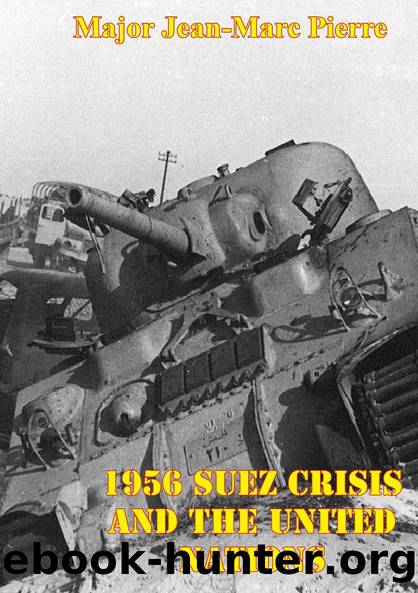1956 Suez Crisis And The United Nations by Major Jean-Marc Pierre

Author:Major Jean-Marc Pierre [Pierre, Major Jean-Marc]
Language: eng
Format: epub
Tags: History, Military, Special Forces, Middle East, Israel & Palestine, Iraq, United States
ISBN: 9781782896081
Google: YxRvCwAAQBAJ
Publisher: Pickle Partners Publishing
Published: 2014-08-15T05:02:55+00:00
American Strategic Interests
President Dwight D. Eisenhower had other worries by 1956. In 1952, the former General had run for president as an anti-war candidate. The US had borne a considerable global burden since the end of World War II: the Cold War and the Korean War. The American public expected their icon to provide a peace dividend. Eisenhower therefore ran on a âPeace in Koreaâ platform and won the 1952 election overwhelmingly. After a 1955 heart attack, a visibly weakened Eisenhower ran for re-election in 1956. Then the Suez Crisis happened at the height of the summer campaign season with such suddenness that the Republican Party feared they could not capitalize on the Presidentâs popularity.
Some voters understood that America had the Panama Canal and plenty of Texas oil. To them, the Suez Crisis posed no real American security concern. Still, various lobbies appealed to the President. For example, the National Federations of Syrian and Lebanese American Clubs pleaded with Eisenhower to prevent the use of force against Egypt. Exporters and oil executives urged peace to prevent the interruption of world commerce. The Joint Chiefs of Staff advised against the use of force, urging that the US should focus on keeping the Soviets out of the region if fighting began. Even the US Senate led by Majority Leader Lyndon B. Johnson made a general statement expressing the need to keep the canal operating âas the major artery of world trafficâ (Divine 1974, 119-120).
Also significant in the American strategic calculation was the Tripartite Declaration Regarding the Armistice Borders of 25 May 1950. The US, Great Britain, and France agreed to allow the sale of arms to the Middle East as long as the purchasing state does not intend to âundertake any act of aggression against any other state.â In addition, they agreed to oppose any war between states in [the Middle East]. Consistent with their obligations as members of the United Nations, the three governments would take action both within and outside the United Nations to prevent such violations (Kunz 1991, 197-198). When the war came, Eisenhower believed the 1950 agreement outlawed the Anglo-French strike. The British and French countered that the pact was null and void during the Israeli Operation Kadesh; the Europeans had no intention of using their troops to âdefend Nasserâ (Lloyd 1978, 176).
Download
This site does not store any files on its server. We only index and link to content provided by other sites. Please contact the content providers to delete copyright contents if any and email us, we'll remove relevant links or contents immediately.
The Radium Girls by Kate Moore(12028)
100 Deadly Skills by Clint Emerson(4925)
Rise and Kill First by Ronen Bergman(4788)
The Templars by Dan Jones(4689)
The Doomsday Machine by Daniel Ellsberg(4490)
The Rape of Nanking by Iris Chang(4211)
Killing England by Bill O'Reilly(4001)
Stalin by Stephen Kotkin(3965)
Hitler in Los Angeles by Steven J. Ross(3946)
12 Strong by Doug Stanton(3550)
Hitler's Monsters by Eric Kurlander(3342)
Blood and Sand by Alex Von Tunzelmann(3203)
The Code Book by Simon Singh(3189)
Darkest Hour by Anthony McCarten(3133)
The Art of War Visualized by Jessica Hagy(3007)
Hitler's Flying Saucers: A Guide to German Flying Discs of the Second World War by Stevens Henry(2754)
Babylon's Ark by Lawrence Anthony(2678)
The Second World Wars by Victor Davis Hanson(2524)
Tobruk by Peter Fitzsimons(2516)
